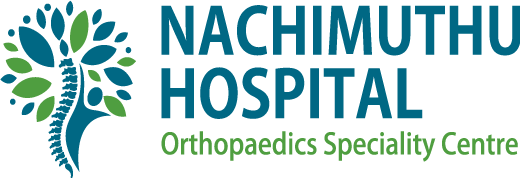About Nachimuthu Hospital, Karur
Hospital brings together state-of –the-art and highly sophisticated medical technology and infrastructure with a dedicated team of physicians, surgeons, nurses, and other healthcare professionals under one roof to provide the highest standards of medical treatment. Our full range of primary and specialty care medical service enables cross- specialty consultation, which assures outstanding treatment for each and every patient.
What is COVID-19?
COVID-19 is the disease caused by a new coronavirus called SARS-CoV-2. WHO first learned of this new virus on 31 December 2019, following a report of a cluster of cases of ‘viral pneumonia’ in Wuhan, People’s Republic of China.
The timeline: discharge from isolation
Someone has positive PCR test and no covid-19 symptoms
- The day of the test is counted as day 1.Watch Symptoms.
- If no symptoms appeare,isoleted for 10 days


Someone with COVID19 symptoms and a positive PCR test
- Isolation always includes 10 days from symptom onset plus an additional 3 days without symptoms.
- The minimum isolation period is 13 days, with release on day 14 (or later if symptoms persist).


Symptoms of severe COVID‐19 disease include:
- Fever
- Dry cough
- Fatigue
Other less common symptoms are:
- Irritability
- Confusion
- Reduced consciousness
- Anxiety
- Depression
- Sleep disorders
- More severe and rare neurological complications such as strokes, brain inflammation, delirium and nerve damage.
How long does it take to develop symptoms?
- The time from exposure to COVID-19 to the moment when symptoms begin is, on average, 5-6 days and can range from 1-14 days. This is why people who have been exposed to the virus are advised to remain at home and stay away from others, for 14 days, in order to prevent the spread of the virus, especially where testing is not easily available.
Are antibiotics effective in preventing or treating COVID-19?
- Antibiotics do not work against viruses; they only work on bacterial infections. COVID-19 is caused by a virus, so antibiotics do not work. Antibiotics should not be used as a means of prevention or treatment of COVID-19.
About Sputnik
Sputnik V is the world’s first registered vaccine based on a well-studied human adenoviral vector-based platform. Sputnik V is already registered in more than 65 countries. The ongoing Sputnik V post-registration clinical trial in Russia involved more than 31,000 volunteers. Phase 3 clinical trials of Sputnik V have been conducting in the UAE, India, Venezuela and Belarus. Sputnik V is one of the three vaccines in the world with efficacy of over 90%. The Vaccine’s efficacy is confirmed at 91.6% based on the analysis of data on 19,866 volunteers, who received both the first and second doses of the Sputnik V vaccine or placebo at the final control point of 78 confirmed COVID-19 cases. According to analysis of data from 3.8 million vaccinated persons in Russia Sputnik V demonstrates 97.6% efficacy.
RDIF jointly with partners and manufacturers is ramping up the production of Sputnik V. The cost of one dose of the vaccine for international markets is less than $10 (Sputnik V is a two dose vaccine). The vaccine can be stored at a temperature of +2 to +8 degrees Celsius, which allows for easy distribution worldwide, including hard-to-reach regions. The vaccine supplies for the global market will be produced by RDIF’s international partners in India, Brazil, China, South Korea and other countries.

